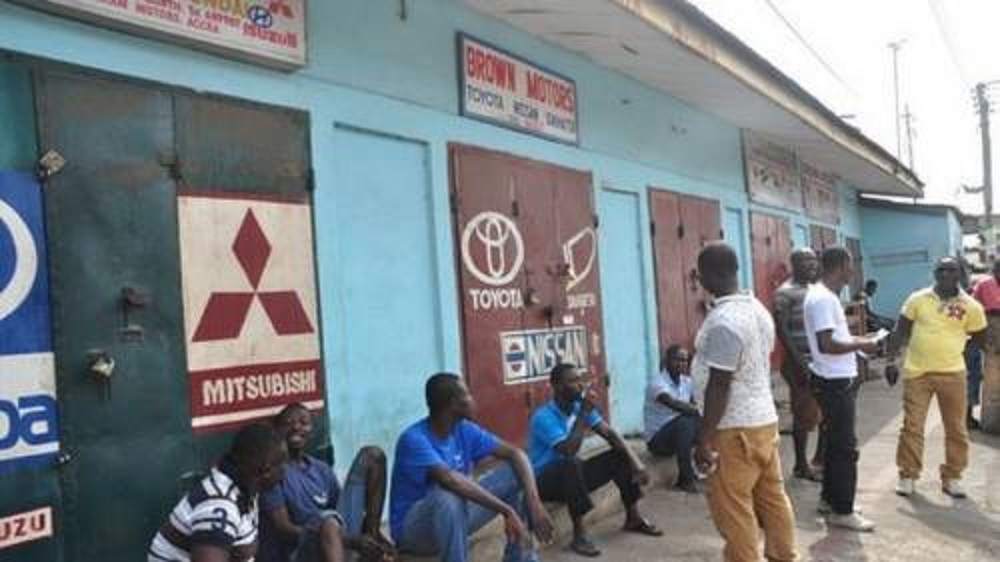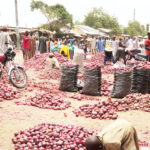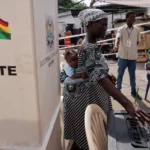The federal government said on Thursday that it will not hesitate to bring back its traders from Ghana if that will bring a lasting solution over the protracted business row.
This followed a letter by 753 members of the Nigerian Union of Traders Association in Ghana calling on the federal government to evacuate them back home because of constant harassment.
Several businesses, many owned by Nigerians in Ghana, have been facing challenges in the demand for $1m (N380m) capital base for foreign traders, as enshrined in the Ghana Investment Promotion Centre, GIPC Act (2013).
Many of the Nigerian traders said they could not afford the amount. Ghanaian authorities have locked their shops and business premises, insisting that they must pay.
The letter calling on the federal government to help them return home was presented to the Chairman/CEO, Nigerians in Diaspora Commission (NIDCOM), Abike Dabiri-Erewa, by the President of the Nigerian traders in Ghana, Dr Ken Ukoaha, in Abuja, on Wednesday.
Apart from members of the Nigerian Union of Traders Association in Ghana, those from the National Association of Nigerian Traders (NANTS) had also expressed their readiness to return home.
They said the payment of $1m to remain in business was unjust, unfair, and a breach of the ECOWAS protocol.
But the Ghanaian authorities remained adamant, insisting that shops of citizens of other countries including Nigeria must remain shut until they complied.
Responding to the call late Wednesday in a statement, Gabriel Odu of NIDCOM’s Media, Public Relations and Protocol Unit, quoted Dabiri-Erewa expressing their willingness to bring Nigerians back home.
She, however, called for peace, stressing that all relevant stakeholders would be engaged to find a lasting solution.
According to the statement, “She said it is indeed sad that their shops have not been reopened for almost one year citing draconian conditions against ECOWAS Protocols of Free Trade and the movement of goods and services.
“The NIDCOM boss, however, pleaded again with the traders not to allow tempers rise as she will convey their message for support to relocate back home to the appropriate authorities for further consideration and to speed up the process with strategic ministries and agencies to bring a lasting solution to the issues.
“Mrs Dabiri-Erewa also said Nigeria will not hesitate to gladly and safely welcome her citizens back to the country,” the statement said.
Until recently, Nigeria and Ghana had positive relationship for decades. Many Ghanaians live in Nigeria and vice versa.
Fears over failing diplomatic relationship
Leaders of the Nigerian traders said there were clear indications that Ghana will not change its position.
According to them, “Diplomatic niceties at the highest level between Nigeria and Ghana have not yielded positive results.
“Landlords are coming to ask us for rent. How do we pay with our shops locked up for so long? We are dying here,” they said in their letter to the Nigerian authorities.”
There were insinuations in certain quarters that Ghanaian were deliberately “punishing” Nigerian traders through difficult taxes to force the federal government to reverse the closure of land borders.
Besides Ghana, other neighbouring countries including Benin, Niger, Chad, and Cameroon relied heavily on importing goods and services into Nigeria for their earnings.
On Tuesday, the Minister of Interior, Rauf Aregbesola, called on Nigerian traders in Ghana not to leave, saying they would find a lasting solution to the impasse.
Before then, Speaker of the House of Representatives, Femi Gbajabiamila was in Ghana at the instance of President Muhammadu Buhari to seek a diplomatic solution to the problem.
During the visit, Ghana’s President Nana Akufo Ado assured the speaker that his government will review its hostile trade policy against Nigerians in that country.
He said the government will “consider the resolutions reached at the Legislative Diplomacy Bilateral Meeting between Nigeria and Ghana’s senior legislators on 2nd September 2020, at the Ghanaian Parliament House.”
According to him, “The legislative diplomacy dialogue became imperative as the parliaments of the two countries, sought modalities to resolve challenges and provide an enabling business environment for foreign traders including Nigerians doing business in Ghana.”
Evacuation not the best option – Expert
A diplomatic expert, Ambassador Gani Lawal, has cautioned the federal government against evacuating its nationals from Ghana over the mistreatment of Nigerian traders in that country. Lawal, who is also the president, Association of Foreign Relations Professionals of Nigeria (AFRPN), said evacuation is done only when there was war.
He said instead of evacuating its nationals, the Nigerian government should engage the Ghanaian authorities more to resolve the issue.
He said: “The diplomatic effort has not yielded fruits, and why it has not yielded fruits is because we have not done enough. There is no synergy between the diaspora commission and the foreign affairs ministry.
“It is not every time we have hiccups with another country that we resolve to the evacuation of our nationals. No. What has to be done is to try to continue to put more fuel into diplomacy to ensure that the matter is resolved.
“When you bring them back to Nigeria, are you going to feed them? House them? Is that the way it is done? They are going to lose all their property over there. That is not the way it is done. It is not about evacuation. Evacuation is always as a result of war when it has become a life and death issue.
“What I will suggest is that Nigeria should do more in terms of diplomatic entreaties to make sure that Ghana relaxes its rules,” he said.
The diplomat blamed the maltreatment of Nigerian traders in Ghana on the closure of Nigerian land borders and urged the government to resolve the border closure issue with its neighbours.
He said: “I can tell you that the reason for this is no more than the closure of the border. If you close your border and their traders who rely on your country can no longer trade, how do you want your traders to enjoin their economic atmosphere?
“Even if the government does not want to do anything, the citizens will do something. That is exactly what is going on now. They lost a lot of money as a result of the border closure. Their goods perished at the border. Who is going to be happy with that? You must have run a lot of them into bankruptcy by that singular act.
“Nigerian government should find a window by which the closure of the border can be resolved by giving exemption to Ghanaian traders, who are coming for their legitimate business here. You should be able to separate smugglers from legitimate traders,” he said.
On implication on relations between both countries, Ambassador Lawal said: “Internal policy is always the harbinger of foreign policy. If the internal policy in Ghana is hostile to Nigeria, naturally, the foreign policy will be hostile too.
“Nigeria will do the same. It will not work against the interest of its people because of international relations. We should just do more to make sure that all the rough edges are sharpened.
“We need to up our game in terms of prosecuting our foreign policy in such a way that our nationals all over the world will not be endangered as a result of the policy options we choose,” he said.
Traders’ unions in Nigeria differ
Reacting to the planned evacuation of the Nigerian traders from Ghana, the Director-General of the Abuja Chamber of Commerce and Industry, Victoria Akai told Daily Trust that the ECOWAS Trade Liberalization Scheme (ETLS) offered unhindered market access to the 15 countries.
“The maltreatment of Nigerian traders in Ghana was one of several issues that have attracted several interventions of presidents of Nigeria and Ghana and several government officials,” she said.
She said that since the maltreatment has not been stopped, it was a wise idea to relocate the traders back to Nigeria, adding that after all there were incredible and enormous potentials in Nigeria.
“Nigerians have no business going to other countries to trade where they are not wanted. But the government must first provide the conducive business environment for their businesses to thrive,” she said.
However, the Director-General of Lagos Chamber of Commerce and Industry (LCCI), Dr Muda Yusuf, suggested that the issues be resolved diplomatically.
“I am not sure we have exhausted the diplomatic engagement options. We are dealing with a sub-regional matter. Nigeria is the leading entity in this sub-region and I believe we could do better for our nationals facing challenges in Ghana,” he said.

 Join Daily Trust WhatsApp Community For Quick Access To News and Happenings Around You.
Join Daily Trust WhatsApp Community For Quick Access To News and Happenings Around You.


